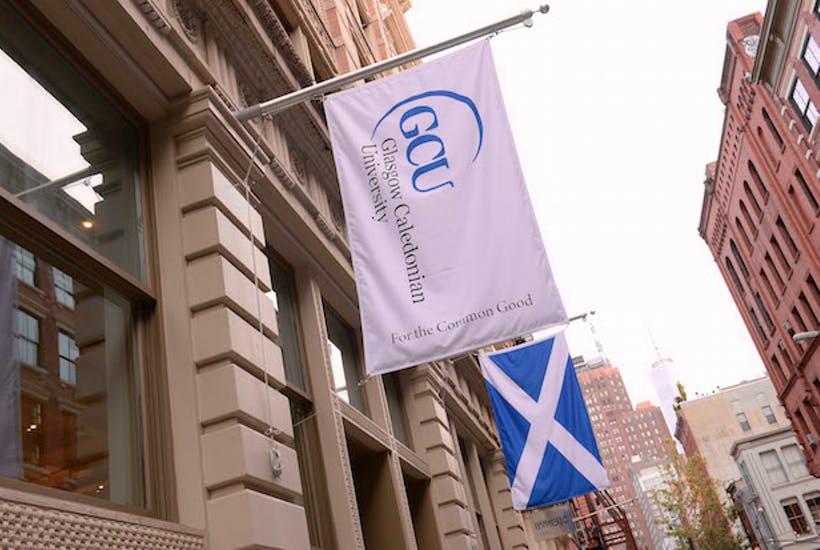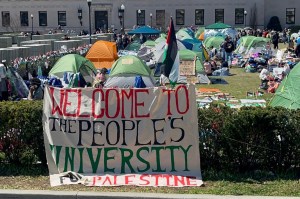In her column in this week’s Spectator, Mary Wakefield writes about Father Mark Morris, who was fired from his post at Glasgow Caledonian University for having a prayer meeting in response to a recent gay pride march. Wakefield points out that there is more to this story than meets the eye.
She’s not alone in wondering: how can a priest be dismissed for stating the Catholic Church’s position (and off-campus besides)? And why have we returned to the days where clergymen are expelled from campus on ideological grounds? The case of Father Morris is worth examining because he’s the first clergyman to be caught up in the new campus intolerance. During his four years as a Catholic chaplain, Morris was known as a ‘gentle giant’ who said weekly Masses and helped the homeless. He spent most of his time as a parish priest in nearby Balornock. So far, so normal. Glasgow had hosted its annual Gay Pride march – something which, as you might expect, draws mixed reactions from Glaswegians.
Many were delighted, others less so. Some parishioners of the Immaculate Heart in Balornock thought that gathering in prayer would be a charitable, and, moreover, Catholic, response. Fr Morris led his parish in a ‘Rosary of reparation for the gross offence to God which is Pride Glasgow’, as listed on the online parish bulletin. The prayers were conducted inside his church – three miles away from campus — and had nothing to do with Glasgow Caledonian University. Unpalatable though it may be in 2018, this is all in complete alignment with the Catholic Church’s position: that all sex outside of traditional marriage is sinful – as is celebrating sin.
However, identifying a ‘gross offence to God’ then praying about it with a bunch of grannies is, it turns out, a gross offence against the Church of Equality, Diversity, and Inclusion. After learning about Fr Morris’s off-campus Catholicism, the university initiated the removal of Fr Morris as Chaplain. This is what they said:
The University respects Fr Morris’s right to his beliefs and his right to express them publicly. The University’s concern is with the incompatibility of these publicly promoted beliefs with the honorary role of a university chaplain which is to provide spiritual and pastoral support for students and staff, including Catholic LGBT students and staff.’
Given that the priest’s ‘publicly promoted beliefs’ are nothing more than Church’s teaching (as expressed some time ago by Pope John Paul II) the university is saying that it regards Catholic doctrine as being ‘incompatible’ with the role of a Catholic chaplain. Which is quite a statement. In saying ‘the university and the archdiocese concluded,’ GCU suggests a joint decision.
So was it? I asked Peter Kearney, spokesperson for the Catholic Church in Scotland. His reply:
‘The Archdiocese were put in a very difficult, if not impossible, situation where the university felt that the actions and words of a chaplain were incompatible with his position. The problem with that approach is that it excludes, or dramatically reduces, the possibility of religious freedom.’
This is all eerily familiar. Catholics have more or less shrugged off the historic forms of bigotry that saw them excluded from working in Scotland’s factories, shipyards, banks, and football teams a few generations ago. Huge progress has been made in curbing the old form of sectarianism – but not enough thought is going into whether a new form of bigotry might be emerging now. And all because the Church of Equality, Diversity, and Inclusion deems traditionally-minded Christians to be undeserving of the privileges of equality, diversity, and inclusion. BBC Scotland, for example, posted a video on its youth Facebook page depicting a Catholic priest holding up a Mini Cheddar in place of the Eucharist with the words, ‘It tastes like cardboard and smells like hate.’
Or take the statement from Pamela Gilles, principal of the university. She said: ‘I am extremely disappointed to hear of the service Fr Morris has apparently held in response to the very successful Pride event in Glasgow last Saturday. The views implied are antithetical to those held by the university, which is strongly inclusive.’
Again, the views Fr Morris stated are those of his Church – and if Prof Gilles says that Catholicism is ‘antithetical’ to those of the university then that affects all Catholics working at GCU, studying there, or thinking about it. As well as those interested in GCU’s recent New York campus, the self-described ‘University for the Common Good’, that claims to offer programmes ‘based on the best of Scottish and American higher education practices.’ The Pride march is, in part, a reaction to an illiberal era when gay men and women were afraid to admit to their sexuality.
And fair play. In a liberal democracy, people ought to be able to congregate and associate as they like, no matter if it causes offence (even to a minority). But what about creating workplaces, universities, and societies where traditionally-Christian men and women are afraid to admit their religion for fear of being given the boot? The University’s main concern is to stress that it did not ‘fire’ Fr Morris because it did not pay him – but this, if anything, makes it more worrying. If priests are falling victim of campus thought police, then what hope is there for dissenting academics whose salaries are paid by the university? What if any of those academics worship in Fr Morris’s church? Or – Heaven forbid – if any were at the prayer gathering regarded by the university as heretical?
Fr Morris might be the first priest to be fired by a university for his religious beliefs, but he probably won’t be the last. Consider the following: There was a Gay Pride Parade — and two orthodoxies were left grossly offended. One sought reparation through the power of prayer. The other sought reparation through the mighty menace of bureaucracy. And yes, let’s be perfectly clear. Father Morris was ‘fired’, ‘axed’, ‘removed’, ‘sacked’… spirited away… for practicing his Catholic faith. A faith shared by millions of people. Now the Archdiocese of Glasgow has the task of filling the vacancy at GCU. ‘Catholic chaplain needed.’ Perhaps they should add, for old time’s sake, ‘Catholics need not apply’.


















